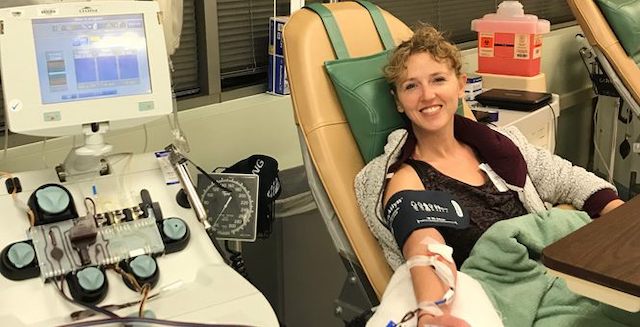 A headache, a tickle in the throat and queasiness. That’s how 33-year-old Jillian Deganhart’s Wuhan coronavirus symptoms started. The high school teacher from Brighton, Colorado was one of the earlier cases as the pandemic became more rampant in the United States.
A headache, a tickle in the throat and queasiness. That’s how 33-year-old Jillian Deganhart’s Wuhan coronavirus symptoms started. The high school teacher from Brighton, Colorado was one of the earlier cases as the pandemic became more rampant in the United States.
“The tickle in my throat and the headache began around noon on Sunday and then I got queasy when I got ready for bed,” Deganhart told Townhall. “The next morning I had a low-grade fever.”
Deganhart said she recognized the symptoms but thought “that’s really unlikely. There’s no way it could be coronavirus.”
She thought about her interactions and who she had come in contact with. There was only one possibility that made sense: she had recently met with a student to go over missing school work. The student had just come back from Scotland and France (and possibly Italy) five days before her symptoms began.
“He didn’t quarantine and he mentioned to me that a person on his plane had the coronavirus,” Deganhart explained. “The only reason I was tested was because of my student’s travel, not because of my symptoms.”
When Deganhart had the virus at the end of February and beginning of March, testing was very, very limited in the United States. Local hospitals and health departments were selective about who received testing.
“It took four days for me to get my results back. By then I had a 100.3 fever, chills and my head was killing me,” she recalled.
Deganhart said her local health department made her diagnosis easier to deal with.
“The health department was kind and helpful from the moment my results came back positive,” she recalled. “They did contact tracing and made everyone aware of my positive symptoms.”
Part of the contract tracing included alerting the school district Deganhart works at. The school was required to close for 72 hours while a deep clean took place. The move was precautionary considering she hadn’t been to school in a week and had self-quarantined at home.
“This was happening at the same time as schools across the nation were beginning to close,” she told Townhall.
Even though Deganhart could have remained anonymous and not said anything to her students, she decided to speak out about her positive diagnosis.
“I felt like I wasn’t supposed to tell because so much stigma and fear surrounding the virus. Maybe I’m not supposed to tell anyone. I’m a transparent person so I reached out to my students and told them,” she explained. “I said, ‘We’re all going to get through this.'”
The teacher felt slightly guilty for causing a disruption at her school, but the health department reassured her that she made the right decisions, which put her at ease.
“They told me, ‘You called right away, you quarantined from your own family, you didn’t go to school,” Deganhart told Townhall. “I didn’t feel like I could have done anything differently, aside from contracting the virus.”
The most difficult aspect of the entire ordeal wasn’t the virus itself but the confusion over incubation periods, whether or not she was still contagious and how long she needed to self-quarantine for. At first, Deganhart was told she needed to quarantine for 14 days after her symptoms began. When she was 10 days into her quarantine, the health department told her she was okay as long as she hadn’t had a fever in 72 hours. She explained that she hadn’t had a fever in over a week. The health department told her it was likely that she was negative by now.
“The health department said I should be okay to leave the house,” Deganhart recounted. “I called my doctor’s office and they said [that quarantine was necessary until] seven days after symptoms began and that I should be negative.”
A couple of weeks after Deganhart tested positive, the Children’s Hospital of Denver was looking for blood donors, something Deganhart wanted to do. She was unsure if she could because of her recent positive Wuhan coronavirus test.
“The doctor called back and had requested an experimental treatment with the FDA and was waiting for confirmation. He told me, ‘If we get permission, we’d love to collect your blood plasma,” she recalled. “The next day the FDA gave them permission.”
The hospital tested Deganhart for the Wuhan coronavirus again. This time her test took three hours to come back and the results were negative.
“They did the normal full donor survey and collected 400ml of plasma. The machine was really cool. I never donated plasma before. It only took about 30 minutes,” she explained.
When Deganhart donated her plasma, she was told it was going to treat a patient at a university hospital in Denver who was in intensive care with the virus. Researchers now believe that giving plasma from coronavirus survivors can help patients who currently have the virus.
What made the donation even more special for the teacher: she was a patient at Denver Children’s Hospital when she was a child.
“I went to that hospital as a kid because of a blood disease and it felt really cool to go back and contribute this way,” she said.
The teacher has one piece of advice for those who are diagnosed: stay home, let your body rest, have Tylenol on hand and a good book to read.
If anyone has any symptoms of the Wuhan coronavirus, including a fever, cough, chills or difficulty breathing, they should contact their doctor immediately. The Center for Disease Control also has a “self-checker” test to determine whether or not a person should be tested for the virus.
Written by Beth Baumann for Townhall ~ April 4, 2020
